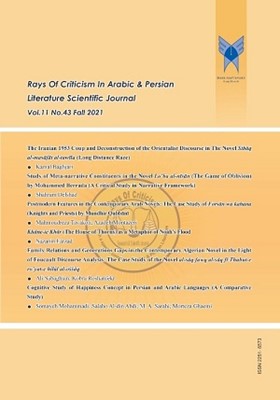A Cognitive study of happiness concept in Persian and Arabic languages (comparative study
Subject Areas : Literary criticismSomayah Mohammadi 1 , Salah-Aldin Abdi 2 * , Mohammad Amin Sorahi 3 , Morteza Ghaemi 4
1 - Ph.D Student in Arabic Language and Literature, Bu-Ali Sina University, Hamedan, Iran
2 - Associate Professor, Department of Arabic Language and Literature, Bu -Ali Sina unersity, Hamadan, Iran
3 - Assistant Professor, Department of English Language and Literature, University of Guilan. Guilan, Iran
4 - Profesor, Department of Arabic Language and Literature, Bu-Ali Sina University, Hamadan, Iran
Keywords: cognitive metaphor, comparative study, happiness concept, Persian and Arabic languages,
Abstract :
Happiness includes a range of soft and intense emotions and enjoying a subject up to happy feeling in life. Forasmuch as a part of happiness concept is structured by language data in addition to literatures, art, custom, etc., we use cognitive metaphor as an effective tool for analyzing language which is one of mind aspects. Cognitive metaphor is attributed to understanding and expression of an abstractive concept based on a more physical concept. In this research, we study data according to Kovecses cognitive theory and intend to find the way of speakers thinking about happiness, understanding and their similarities and differences in the mentioned languages. Importance of cognitive study of this data is that it systematizes their different and scattered range according to names mapping and also accurate cognitive pattern. Data of this research show that derivative feature of Arabic language provides a wide vocabulary variety for happiness conceptualization in this language as if some metaphors of Persian language compared with Arabic samples have more distance with general metaphors and bears further and complicated special cultural features. Also in connection with the metaphor of "happiness is up", "distance from the earth" in Arabic can be more prominent than in Persian.
القرآن الكريم
راسخ مهند، محمد. (1393ش). درآمدی بر زبانشناسی شناختی: نظریهها و مفاهیم. ط 4. طهران: سمت.
زور ورز، مهدیس و آزیتا افراشی و سید مصطفی عاصی. (1392ش). «استعارههای مفهومی شادی در زبان فارسی: یک تحلیل پیکرهمدار». مجلة زبانشناسی و گویشهای خراسان. جامعة فردوسی مشهد. السنة الخامسة. العدد 2. صص 72-49
صراحی، محمد امين. (1391). بررسی مقابلهای استعاره در زبانهای فارسی و انگلیسی براساس نظریه استعارههای مفهومی. رسالة دکتوراه في زبانشناسی همگانی. اصفهان: جامعة اصفهان.
کوِچش، زُلتن. (1398ش). مقدمهای کاربردی بر استعاره. ترجمه: شیرین بورابراهیم. ط 2. طهران: سمت.
مجموعة من المؤلفين. (لاتا). المنجد في اللغة العربیة المعاصرة. بیروت: دارالمشرق.
محمدیان، عباس و مجید فرحانیزاده. (1397ش). «استعاره مفهومی شادی در دیوان شمس». دو فصلنامه علمی پژوهشی مطالعات زبانی و بلاغی. السنة التاسعة. العدد 18. صص 350-319
ملکیان، معصومه و فرهاد ساسانی. (1392ش). «بیان استعاری غم و شادی در گفتار روزمره». مجلة پژوهشهای زبان شناسی تطبیقی. السنة الثالثة. العدد 5. صص 139-113
مولودی، امیرسعید و غلامحسین کریمیدوستان. (2017م). «رویکرد پیکره بنیاد به استعارههای شناختی در زبان فارسی: مطالعه حوزه مقصد ترس». فصليّة هنر زبان. مستمر 2. العدد 4. صص 40-7
نجفی، ابوالحسن. (1387ش). فرهنگ فارسی عامیانه. ط 2. طهران: نیلوفر.
_||_

